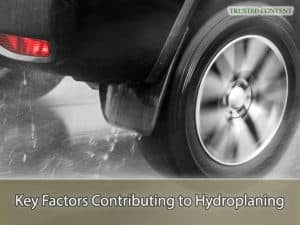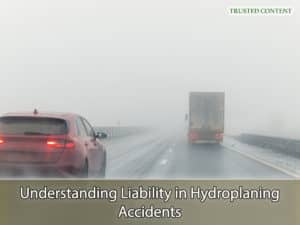Hydroplaning, a phenomenon that occurs during wet conditions, poses a significant risk to drivers in California. This article aims to provide a comprehensive understanding of hydroplaning, the factors contributing to such accidents, and the legal implications for those involved. Understanding these aspects is crucial for drivers in California, as it helps in both preventing accidents and knowing one's rights in the aftermath of a hydroplaning incident.
What is Hydroplaning?
Hydroplaning happens when a layer of water builds up between the tires of a vehicle and the road surface, leading to a loss of traction. This prevents the vehicle from responding to control inputs such as steering, braking, or accelerating. Hydroplaning typically occurs during heavy rain but can also happen in other wet conditions. It's a dangerous situation that can lead to loss of vehicle control, potentially resulting in accidents.

Key Factors Contributing to Hydroplaning
Key Factors Contributing to Hydroplaning
Several factors contribute to hydroplaning, including vehicle speed, tire tread depth, and road conditions. High speeds can increase the likelihood of a vehicle hydroplaning on a wet surface. Worn tires with low tread depth are less effective at dispersing water, making hydroplaning more likely. Additionally, road conditions such as standing water, poor drainage, and uneven road surfaces can increase the risk of hydroplaning.
Preventative Measures Against Hydroplaning
Preventing hydroplaning involves a combination of proper vehicle maintenance and safe driving practices. Regularly checking tire tread depth and ensuring proper tire inflation are crucial steps. Drivers should also be aware of their speed, especially in wet conditions, and avoid areas of standing water on the road. Employing these preventative measures can significantly reduce the risk of hydroplaning.

Understanding Liability in Hydroplaning Accidents
Understanding Liability in Hydroplaning Accidents
In California, liability in hydroplaning accidents can be complex, involving multiple factors and parties. Determining who is at fault requires a thorough understanding of the circumstances surrounding the accident.
Driver Responsibility in Hydroplaning Accidents
Drivers may be held liable if their actions contributed to the accident. This includes driving at excessive speeds for the conditions, failing to maintain their vehicle, particularly the tires, or engaging in reckless driving behavior.
Role of Tire Manufacturers
Tire manufacturers could be held responsible if the accident was caused by tire defects. Faulty tire design or manufacturing defects that lead to inadequate water dispersion can be grounds for liability.
Government and Road Maintenance
The state or local government could be liable if poor road conditions, such as inadequate drainage or poorly maintained roads, contributed to the accident. This aspect of liability often requires an in-depth investigation into the road conditions at the time of the accident.
Property Owner Responsibilities
In cases where hydroplaning occurs near private property, the property owner might be held liable if they failed to address known hazards that could lead to hydroplaning.
Legal Representation in Hydroplaning Cases
Due to the complexity of hydroplaning accidents, securing legal representation is crucial. An experienced lawyer can help navigate the intricate details of liability and insurance claims, ensuring that your rights are protected. They can provide guidance on the best course of action, whether it's negotiating with insurance companies or pursuing legal action.
Understanding Your Rights in Hydroplaning Accidents in California
Understanding Your Rights in Hydroplaning Accidents in California
If you or someone you know has been involved in a hydroplaning accident in California, it's important to understand your legal rights and options. Contacting a knowledgeable lawyer can provide you with the necessary guidance and support. At Napolin Accident Injury Lawyer, we offer a free consultation to help you understand your rights and options. Call us at (866)-NAPOLIN to discuss your case and benefit from our extensive experience in handling such matters.
- Understanding Uber Accidents and Insurance Coverage Periods in California - April 8, 2025
- A Guide on Red Light Auto Accidents in California - August 14, 2024
- Self-Representing in a California Personal Injury Claim - August 13, 2024
